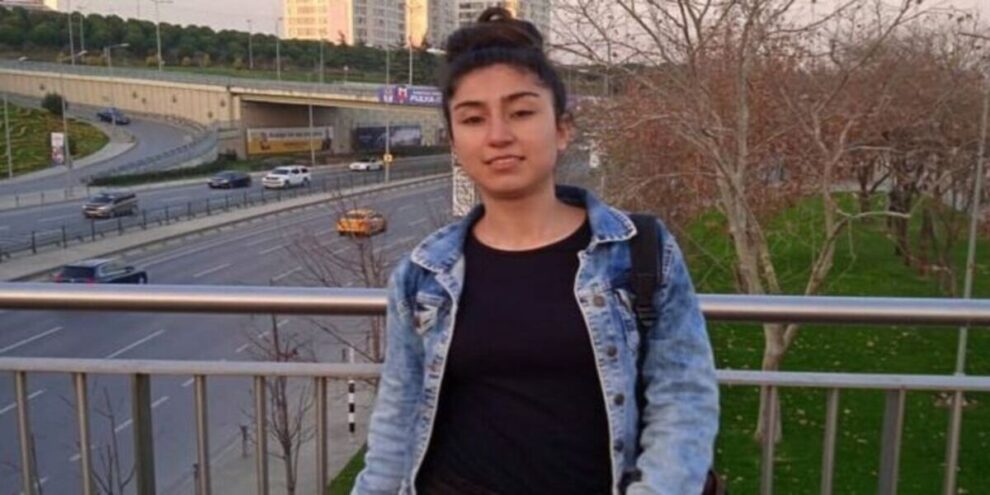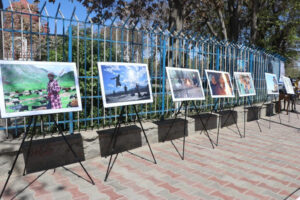Maeda Hussaini wanted to be an astronaut and even sent an application to NASA.
It may seem unattainable that a 17-year-old girl from Afghanistan has the sky in her sights.
Even when the Taliban took power in August 2021 and her family fled to Iran, Maeda refused to give up on her dream.
She decided to go to Europe and continue her studies.
She decided to travel by land to Turkey and then risk crossing the sea. Her mother was worried but Maeda finally won.
“I said, ‘Go to my daughter, God bless her,'” said Mahtab Forough. “She was talented. I am her mother, I raised her.”
Maeda was among an estimated 200 people on a wooden boat that set sail from Turkey on February 22. Four days later, it broke up near the Italian coast of Crotone.
“Hello mom, I hope you’re okay. I’m fine and happy. I’m still on the boat. I’ll be disembarking in 30 minutes.”
Mahtab’s last voice message from her daughter is accompanied by the sound of the boat engine and the waves in the background.
After a text message.
“Dear mother, I am almost in Italy, landing in a little while, happy and healthy. Don’t worry.”
It’s rare for young women to travel alone because the risks are so high, but Mahtab said her first child made that decision.
Seven months ago, Maeda was shot in the leg while crossing the border from Iran to Turkey. The fact that she had a bullet in her leg for 10 days did not discourage her.
Her family said that the young woman then made many attempts to get to Europe.
“I was worried about her and asked her to come back to Iran,” said her mother Mahtab. “I said, ‘Aren’t you tired of trying to get out again?’
At least 70 people died in the disaster and Maeda’s body has not yet been found.
The fatal journey
Turkey is the main transit point for Afghans who want to reach Europe. They cross the Balkans or cross the sea to reach countries like Italy.
In 2022, Afghanistan accounted for 13% of all asylum applications in the 27 member states of the European Union, Switzerland and Norway, according to official figures.
An Iranian decided not to make the trip at the last minute.
“We were told that 60 to 70 people are coming,” Saman said, not his real name.
But the night we were to leave Istanbul in a truck to go to Izmir, we found out that there were at least 117 people, mostly Afghan families.
“It’s like a bad dream, I still can’t believe it,” he added, terrified to avoid a tragic fate. “I don’t believe in anything. Life is meaningless.”
Two of the people who survived the accident told the BBC that the boat broke down shortly after leaving the coast of Turkey.
The smugglers then sent another boat where people were transferred.
One of the survivors from Afghanistan, whom we called Meraj, said that the boat was very tight but sank when they got close to land.
“Another ship then approached us and flashed its lights on our boat. Our captains panicked and tried to overturn the boat,” he said.
“Our boat made one circle, then a second, third circle, hit something hard and broke apart. Families and children were on the lower deck, men and migrants were on the upper deck,” he added.
“I remember the boat filling up with water, up to my neck, then I smelled oil and lost consciousness. I don’t remember what happened.”
Meraj washed ashore, one of 80 survivors. It is not known where his relatives will end up who were also with the boat.
Italian authorities have arrested three people, a Turkish man and two Pakistanis, who are believed to be the ‘captains’ of the boat.
And Italian police estimate that each person paid $8,500 (£7,000) for the boat’s place.
According to monitoring groups, more than 20,000 people have died or gone missing in the Mediterranean Sea since 2014.
‘I only got my brother’s shoes’
As news of the shipwreck spread, families began arriving in southern Italy, hoping to find their missing relatives.
Laila Timory, 47, drove non-stop from Germany.
“I thought I would finally see my brother all these years. I’ve been waiting seven years to see him.”
Laila left the Kunduz region of Afghanistan in 2015. She still remembers the brief goodbye she had with her brother Zabih.
“We ask for forgiveness in case we don’t see each other again in the future.”
Zabih Timory, 33, his wife Mina, 23, and their sons Haseeb, Arif and Akif were on the boat.
Laila said that Zabih was a lawyer who worked with the former government of Afghanistan and was afraid of the Taliban.
“When I arrived at the scene, the first thing I saw was the body of my cousin Haseeb, 18 months old,” Laila told the BBC.
“They [the Italian authorities] took me to a room and gave me pictures so I could identify them. Pictures of the dead, pictures of people in hospitals and pictures of survivors in the camp. But I couldn’t see the rest of my family.”
Laila then went to the beach to look for her family.
“I couldn’t sit and wait. I saw the remains of the boat, I saw clothes, I felt like my brother could be buried in the sand, waiting for my help,” she said.
“All I could find were his shoes. Later I found a jumper and his wife’s purse.”
Laila and her daughter have not been found since then. Their only hope is that the bodies will eventually wash up on the beach.
“It is very difficult. We heard that half of the people on the boat drowned at the bottom of the sea.
“Some of the bodies can’t even be identified after being in the water all this time,” said Laila.
“All we want is to find the bodies of our relatives to send them home to bury them to rest.”
Back in Iran, Maeda’s parents are still praying for good news. Afghan refugees in Iran, unable to obtain visas to travel to Italy to search for Maeda themselves.
“I’m waiting for her,” said her mother Mahtab. “I don’t allow anyone to bury him, I don’t allow anyone to give me condolences.”
Since the Taliban took over Afghanistan, many girls have been denied their basic rights such as education.
When she reached Europe before she turned 18, Maeda hoped she could get her parents and three younger siblings to join her as part of a family reunification plan.
“She always said, ‘Mom please don’t marry me so young like you,'” Mahtab said.
“I have big dreams. I know my father is just an ordinary worker and he can’t do much so I have to go abroad to succeed.”
Source: British Broadcasting Corporation









